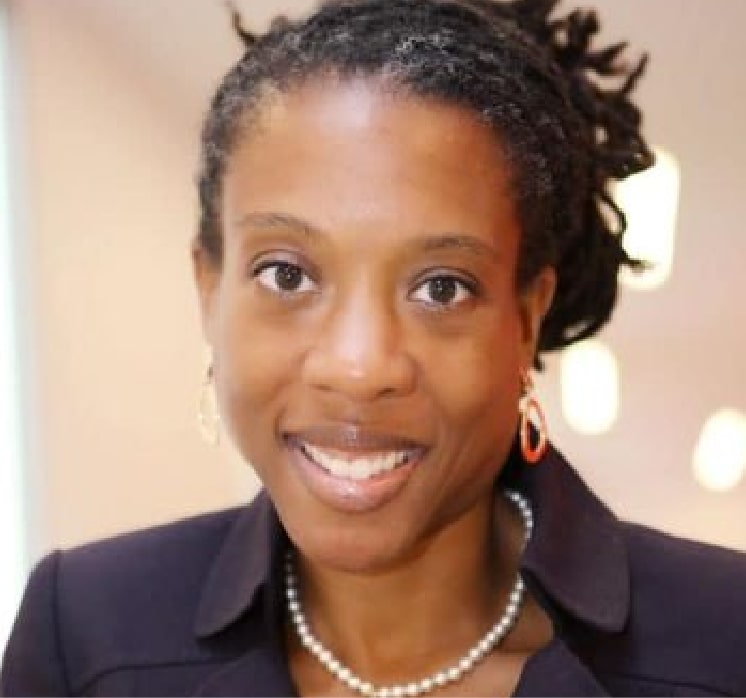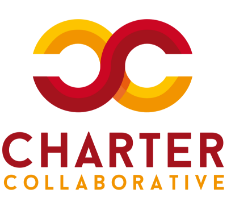
Charlotte Spann
Executive Director of Schools,
Paul Public Charter School
Paul Public Charter School
Location: Washington, DC
Year Opened: 2000
Student enrollment: 726
Grades served: 6th – 12th grade
Website: www.paulcharter.org
Student Demographics
Black/African-American: HS 59% MS 56%
Hispanic/ Latino: HS 39% MS 42%
Asian: HS <1% MS <1%
Two or more races: HS <1% MS <1%
Homeless Students: 5%
FRPM/FRPL %: 87.5%
Students with Disabilities: 21%
ELL/ESL Students: 25%
MY EDUCATIONAL JOURNEY
I was raised in an achievement-focused home. Both of my parents were teachers. I had aunts and uncles who were teachers. It was expected that you achieve, and in my family achievement meant getting your education and getting yourself a good “government job” so you could take care of yourself.
As a child, I was very focused, and I was a good student who had exposure to a lot of different science programs. I was interested in the sciences and becoming a doctor not for the sake of how it could transform lives but for the sake of choosing a career that could launch me into some exciting things. I noticed as a kid that the two things that would make adults shine like your braces on the first day was if you told them you were going to be a doctor or a lawyer, so I thought I was going to be a doctor.
That started a journey that got me to Xavier University as an undergrad, because I initially went there to be a doctor. Over a 4 year period, though, I began to do research programs that allowed me to interface with students who had internships in Sociology and Political Science, which caused me to realize that what I liked more than science was talking to people about how we could impact what’s going on in our community and in our world. That’s what transitioned me into wanting to become an educator.
I started off as an educator in Atlanta Public Schools for about 10 years. I learned so much there and, as I grew, I realized that part of my job was helping scholars understand how to think independently. I also realized that in order to teach kids how to think well, we as adults have to be strong thinkers, and I began to get excited about working with colleagues and leaders to explore how we develop our capacity as thinkers. That led me to work in the central office and then to move up to DC in 2008.
As I’ve progressed in my career, I’ve gone where I’m led. I believe in divine intervention and Grace-led manipulation in the best sense of the word. When I left my last principalship, I wasn’t sure I was going to stay in education, because being a principal is a privilege, but it’s also grueling work. As I was doing my soul searching, the opportunity to join the Paul team came my way. I’m so thankful, because it’s an awesome journey to be part of the Paul work and the collective work on how we disrupt what has been happening with public education and better support children, particularly our Black and Brown children.
COVID-19’s IMPACT ON THE PAUL MODEL
When the pandemic started, we were really trying to focus on maintaining consistency in our model, because of the belief that in the most unpredictable situations, a stabilizing and consistent force is what helps to carry people through. To a certain extent, we’ve done that, but we also realized this was an opportunity to allow ourselves to step into an area of growth, of focus for our scholars, of challenging our own beliefs and policies to ensure equity and accessibility for all scholars continued to be a guiding force. I am really proud of the work we have done while acknowledging that we have so much further to go.
We had been teetering on making changes to increase our focus on equity in periodic conversations and after provocative powerful professional development sessions, but we had never really made significant strides. From a logistical standpoint, of course we had to develop a model that no longer depended on in-person learning. From a broader standpoint and spirit of innovation, we have pushed ourselves to ask, “What does equity mean for learning in a school that doesn’t automatically walk in the same cadence as a traditional approach to schooling?”
We had already laid some serious groundwork and done some really serious examination around how we unpack the different unique micro-group needs of our scholars. What are the nuances of our newcomers’ experiences? We’ve been grappling with that for a minute, because our newcomer population has been growing exponentially. What are the experiences of our ELL students? What are the experiences of our male students, our female students, our gender fluid students? That had become an area of conversation that I’m glad we were forced to explore. What are the unique experiences of our scholars who are in situations where they are in transition, experiencing housing instability, food insecurity, etc.? How do we leverage this opportunity as an intimate charter model to really pull the blanket off of those overarching data points of school performance, grade level performance, attendance, PMF metrics and look at the specific needs of our scholars?
In addition to lunch groups, advisory, 1:1 counseling, and academic office hours, we developed entities called Wellness Teams to unpack and understand how we approach student support differently beyond the legal mandates. That has really been exciting work. It has helped to fortify relationships and helped us to think outside the box. We just finished a meeting this morning about how we can care for our families over the winter break. What kind of outreach can we give them? Who’s going to be available? Who are the families that we already know so we aren’t going to wait for them to reach out to us? That feels like basic work, but I feel like it’s shifting us more in alignment with our mission of really caring for one another so that we can develop these independent thinkers and scholars.
We’re working to ensure that the voices of all stakeholders are being infused into our decisions about how we take advantage of this moment. Some of the push and pull has come from teachers, some of it has come from students. I think we’ve done more focus groups in this setting than we’ve done during the 4 years I’ve been at Paul. That has been an exciting thing, and a necessity.
We’ve really been thinking about the role of each individual staff member, what about their role supports the mission, and how we can expand their support of the mission beyond their title and job description? When we think about our Culture team that deals with student support, safety, affirmation, and discipline, how do we continue to skill them up so that scholars’ interactions with them help kids to feel affirmed and empowered? We’re really trying to add some texture to our work beyond the standard things that happen in schools. This moment has allowed us to evolve in a very innovative way, and I am hopeful that we will we maintain that trajectory.
MANATI FELLOWSHIP EXPERIENCE
I was watching something with Billy Porter the other day, and he said that the biggest problem with America is Whiteness, driven partially by white people but not all by white people, and people’s refusal to let go of the power they feel is associated with Whiteness to the detriment of the humanity of everyone else. Deep seeded in our American culture is this feeling that only one group can be in power.
What I took from Manati is the importance of understanding our role in the power dynamic. White supremacy is a thing, but that doesn’t mean that as a black woman I have no role in the power dynamic and how power shifts and how it’s used and abused. That session that Caroline Hill did around design concepts and power challenged us to think about, as I think of it, “designing for the least of these,” which is a reference to a biblical scripture- those who are marginalized. She did very deep and profound work with us around power dynamics and how oftentimes we design from the lens of mainstream, from the lens of majority and those in power.
Manati has helped to recenter me to the core of who I am as a person and spiritual being. It has helped recenter me to the core of why I started in this work and what my purpose on this earth is. Most importantly, and I say this with all humility, it’s helped to convict me. We all need messages that cause conviction, because conviction helps to humble us, remind us, recenter us, redirect us to make sure we’re in alignment with our purpose. Every section of Manati, with the dialogue, the literature we read, the concrete, actionable work that we are doing, helps us to convict, recalibrate and move forward with purpose with a group of like-minded people.
The accountability partner piece with my partner Kathryn [Procope] at Howard afforded me the opportunity to share best practices and reflect on the learning from Manati, but also to have informal check-ins. We know that this work can get very lonely. It’s hard and your soul gets weary, so I viewed my accountability partner as a soul filler. The content from Manati also allowed us to reach out and make informal connections with each other.
The Action Learning Committee allowed me to share my learning with teachers, principals, assistant principals, and executive team members at my school. I’m a seed planter, so it allowed me to have ways of approaching conversations to begin planting seeds in team meetings, professional development, etc. The process of interviewing the students who seemed most disenfranchised was such a learning experience.
Right now, as an organization, we’re about to embark on an equity audit and develop a comprehensive, multi-year plan for addressing equity and antiracism in our school. We were so far away from that a year or so ago, but the seed planting, the watering, the bringing together of the Action Learning Committee helped with all of that.
WHY CHARTER LEADERS OF COLOR
My vision is knowledge for the sake of service and advocacy to have an impact on the world. I think about the African proverb, “If you want to know how a community is, ask ‘How are the children?’.” That’s stuck with me since I heard it years ago, because the children are ready to lead. As human beings, when we’re born, we’re ready to elevate our voices, to impact, to love. Somehow in our world, that gets stamped out along the way.
My vision is to provide our students with an educational experience that provides the knowledge, the tools, the skills to be compassionate and tolerant human beings who are not paralyzed by the fear of others that’s so deep seeded in our country but rather liberated by diversity. I want to develop a generation of scholars and leaders who are serving, advocating, and lifting up the collective and not just the individual. That speaks not just to being a critical thinker. That speaks to love, to selflessness, to interconnectivity to every other human being. That speaks to purpose, it speaks to power. There is power in like-minded individuals pursuing a noble, humane, and divine purpose. There’s nothing more noble, humane and divine than how we care for our children, and that’s our responsibility.
